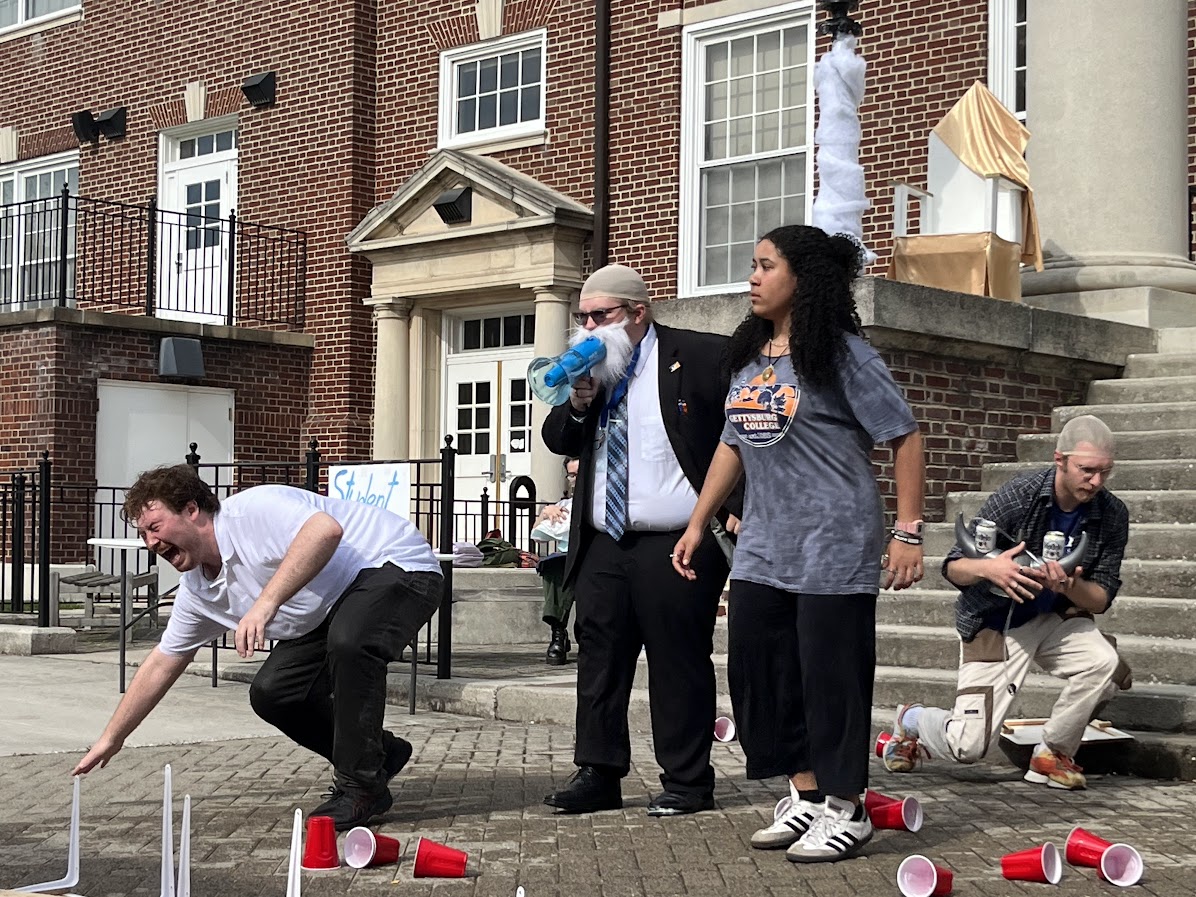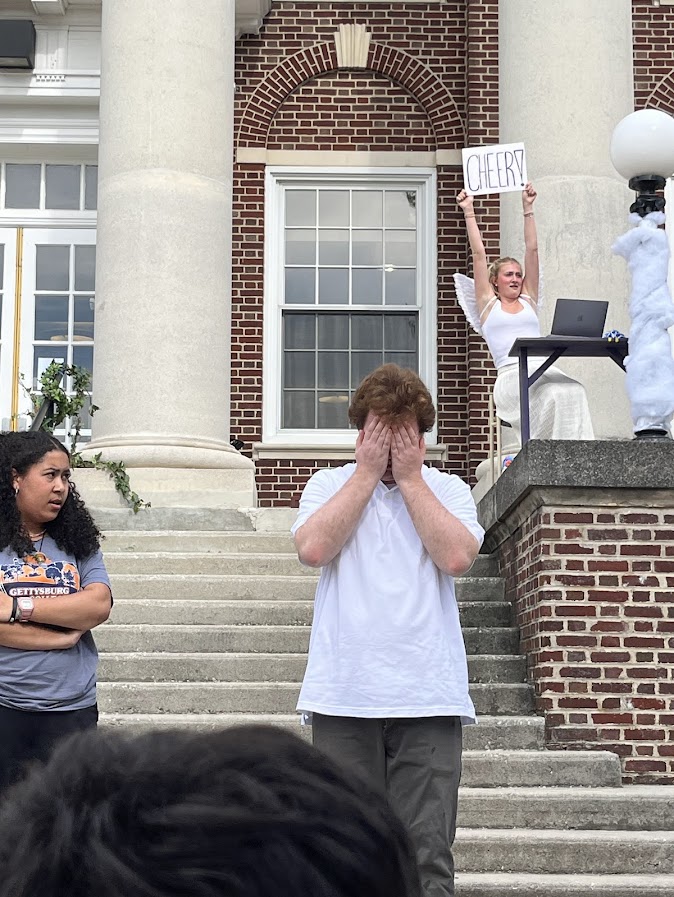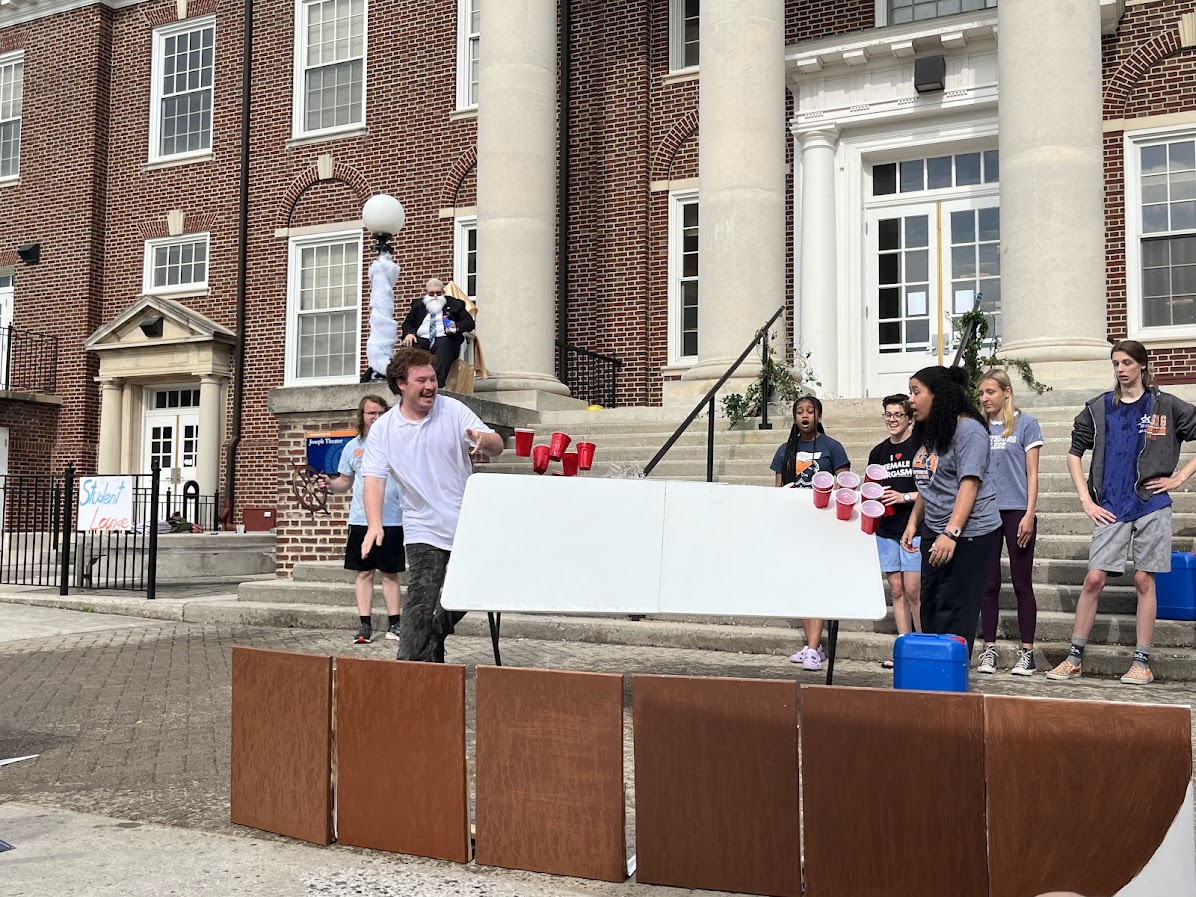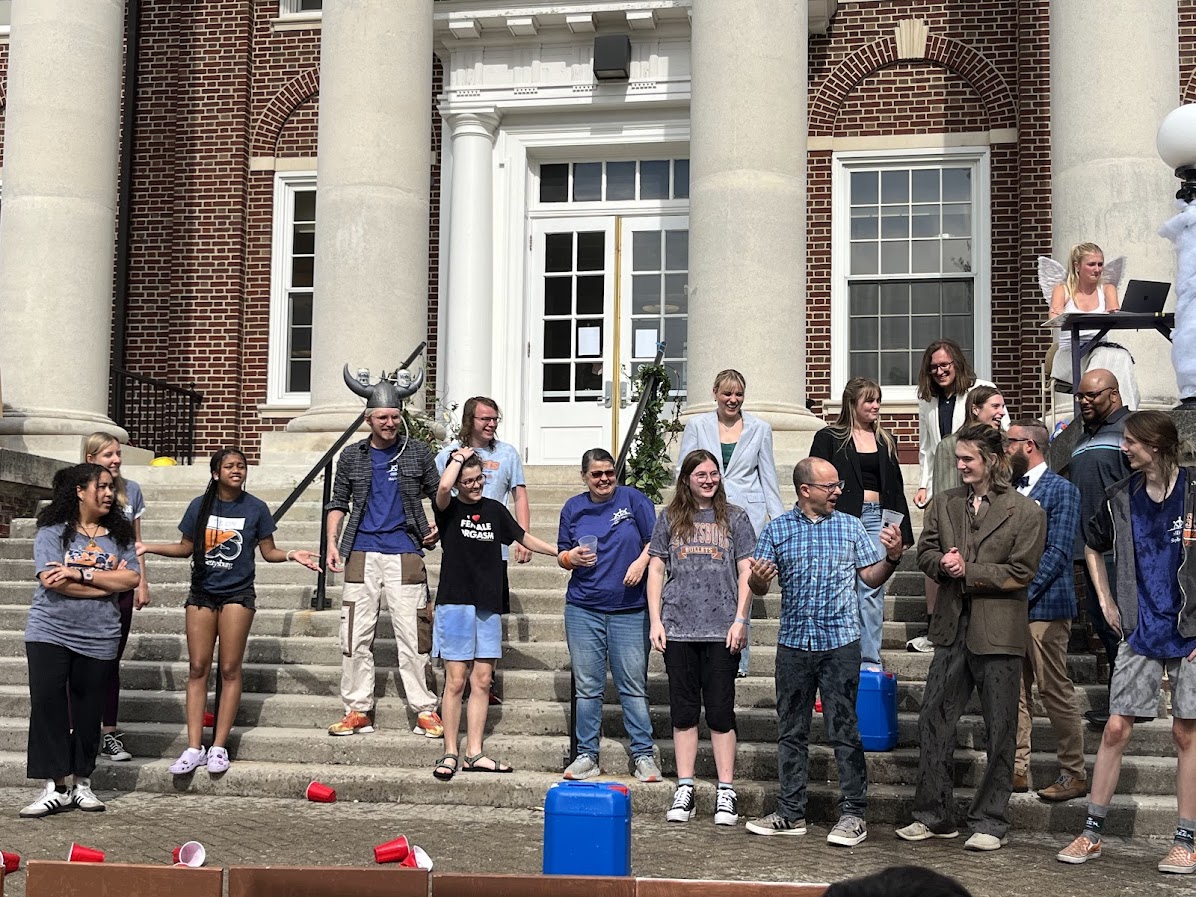By Laurel Bennett, Features Editor
On Friday at 4 p.m., English 312: Medieval Drama performed “Noah: A Consequential Education” outside of Breidenbaugh Hall. The course, taught by Professor of English Christopher Fee, has produced a public performance of a modernization of a medieval play for the last 25 years. This performance acts as students’ final assignment. English 312 has staged 15 productions, and the first production was the Wakefield “Noah” in May of 1999.
Fee said, “The theory of the class is to spend the first few months really taking a deep dive into the texts, contexts, and scholarship regarding Medieval Drama, and then to spend the last month or so of the term taking this knowledge into the practical world of play production in order to breathe new life and relevance into a play that was popular centuries ago but seldom produced since.”
Medieval plays remain relevant in the 21st century due to the themes and issues that continue to live on. Drama has the ability to speak to the audience while simultaneously telling an important story through living art.
“Life today—just like life centuries ago—was full of tragedy and comedy, terrible news and hilarious foolishness, often woven together in the sometimes sublime but often ridiculous tapestry that is the human experience,” Fee explained. “Medieval plays often deal with profound themes and serious issues in a thoughtful yet comic way, so that the audience would remain engaged and yet maybe just learn a thing or two.”
English 312 resituated the Wakefield “Noah” to fit into contemporary times at Gettysburg College, with the themes of global destruction, redemption, sin and salvation being prominent. The class began working on their revamping of the Wakefield “Noah” to just before spring break this semester.
In “Noah: A Consequential Education,” the character of Noah represents a good but insufferable rule-follower. Gill serves as Noah’s situationship-“girlfriend” who represents the fundamentally good but fun-focused rule-bender. The play also features good students, cheaters and partiers.
Faculty members were involved with the performance as well, as they were dragged from the audience. Chairperson of the English Department Christopher D’Addario and Professor of Physics Kurt Andresen performed as themselves in the play.
Fee added, “Noah: A Consequential Education placed special emphasis on how this production participated in Medieval theatrical conventions such as anachronism, parody, and social criticism, mocking cheating amongst students, but also poking fun at institutional and administrative pretentions, as well as funny faculty foibles and silly campus stereotypes.”
Fee continued, “This all was placed by our class in a carnival-like, participatory performance, meant to echo the outdoor summer festivals at which the original play would have been produced, complete with barrels of water and squirt guns and commemorative “mini-rum-buckets” with which the audience was encouraged the soak the performers during the Flood, goaded by an Angel of the Lord who egged on the audience with cue cards with messages such as “BOO!” “CHEER!” and “SPLASH!”’
Noelle Muni ’24 served as the PLA for English 312, and she took the course two years ago.
“My role as PLA was essentially two-fold, much like the class. I was there at class time and outside of class to help students with material and assignments whenever they needed, and also facilitated some of the behind-the-scenes elements of the production and promotion,” Muni said. “I was there also as someone to serve as a reference for how people have undertaken the project before and to provide wisdom and sage advice.”
Muni’s experience with the course gave her the ability to help current students with the development of the production, including the teams and all of the blocking, props, and music.
Muni elaborated, “The class is divided into teams (Translation, Direction, Staging/Scenery, and Props/Costumes) that all take on different roles in developing the production and work together to execute one, cohesive vision of a modern adaptation of the play. That involves translating the text, coming up with a vision, literally staging it, and so much more.”
Muni noted that while some components of the play remained the same from the original version, like the flood, other components were entirely changed, such as the dynamic between the two primary characters.
Andrew Casher ’24 and Hannah Crowley ’24 enjoyed the final assignment for English 312. In particular, Casher enjoyed learning about the Christian origins of plays, which were religious in nature and hosted by churches.
He added, “These plays essentially recount core Old Testament (and New Testament) stories, from Adam and Eve to the harrowing of Hell.”
Both Casher and Crowley were part of the translator group of the play. The translators were responsible for modernizing the play and adding their own comedic and creative lenses to the play. They also put out an article about the play and created handbills.
Crowley noted, “Brainstorming different Gettysburg-themed jokes was one of the most fun parts; it was hilarious workshopping them together.”
“The play itself was easy to write, as we had decided to satirize the very college we attended through a hybrid of medieval and modern tropes, and Gettysburgian inside jokes,” Casher said. “God, or should I say, Bob, commands Noah and his “situationship” Gill to gather their 6 Shipbuilding: 101 students in order to craft an ark to survive a great flood. The flood, in this take on Noah, is ordained to drown all of the students who cheated with ai, namely ChatGPT. The animals, verily, are also “Gettysburgified” in that Noah and his posse must collect professors two-by-two from each department for them to have their final papers graded after the flood.”
The original play featured lots of crude humor and domestic violence which could not be safely translated to represent a college relationship. As translators, Casher and Crowley were involved with changing these moments of violence to verbal assaults and humorous, sensitive jokes.
In addition to being a translator, Casher performed as Professor Fee. He also created transition and thematic music for the play and played the introduction of “Stairway to Heaven” live on stage as a joke.
The rehearsals for “Noah: A Consequential Education” were extensive to ensure that the final version was successful.
Crowley explained, “After the script was finished, we began rehearsals first with table reads in our classroom and eventually moving rehearsals to the stage (steps of Breidenbaugh) to get a sense of the space and be able to use the props we collected. We also had a bunch of out of class rehearsals with the whole group as well as smaller groups for specific scenes. It was really a huge group effort to make the production happen, everyone played an integral part!”
Casher highlighted the work of Fee and Muni for guiding students to participate in the play.
“It was such a pleasure to write and act in this play, and even more of a pleasure to do so with such a fantastic class,” Casher said. “I think it’s safe to say that we all would like to thank Professor Fee and our wonderful PLA Noelle ‘Minion’ Muni for their work and guidance as we put this mammoth project together!”
Crowley echoed Casher’s sentiments, adding, “As someone who’s never really done theater before, it was a really positive environment that encouraged us to go out of our comfort zones and not be afraid to make fun of ourselves a little bit. It was definitely the most fun final I’ve had!”




